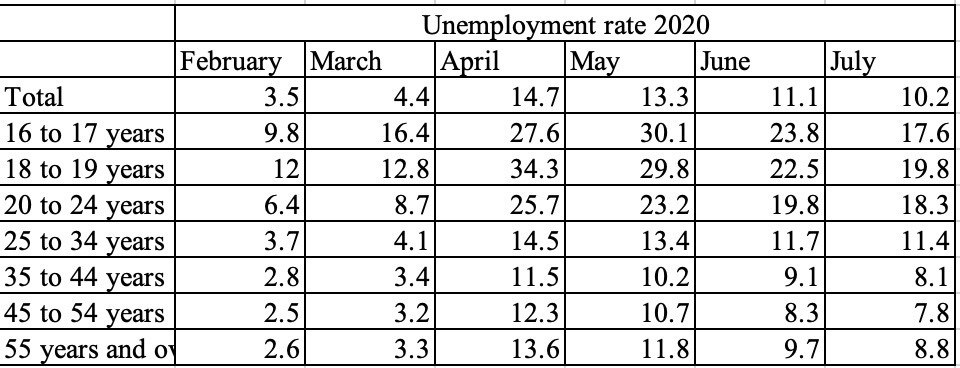The COVID-19-induced recession may have just delivered the biggest economic blow to young people
Throughout the duration of the coronavirus, it has become clear that the effects of the virus are being borne disproportionately. Older people and people with pre-existing conditions, for example, seem to make up a majority of COVID-19 deaths. Small businesses, on the other hand, have made a huge number of permanent business closures. And when it comes to job losses, low-income individuals have been hit the hardest with job losses.
Disaggregated by age, overall, no group seems to have been as economically affected as young people, especially millennials, for two reasons. For one, millennials have already endured one other major recession, so they had little financial cushion when the coronavirus pandemic started. And compared to older generations, they faced a higher unemployment rate.
The plight of Millenials when it comes to unemployment is only comparable to that of younger generations, who while not experiencing a similar proportion of job losses still faced a significantly higher level of unemployment. Either way, such high unemployment levels will make it even harder for these young generations to get a footing in the workplace. Older individuals, while heavily affected by the virus, are not a huge part of the labor force and did not face significant economic disruptions.
Millennials and recessions
During the 2008/2009 great recession, the majority of millennials were just about a few years into the workforce, entering the workforce or finishing up their college education. Millennials spent a big part of their building years facing high unemployment. This has been a defining period for the economic well-being of the average millennial. According to data, compared to prior generations, millennials are less wealthy compared to previous generations at their age. Generally, people in their 20s and 30s have low levels of home ownership, net worth as well as real income.
The coronavirus-induced recession is the second recession that millennials are facing and it has come at a time when the group was starting to catch up from the financial woes of the great recession, taking them off their just recently gained footing.
Young people and COVID-19
Generally, younger workers tend to have higher unemployment rates compared to older workers. This was also true during the pandemic. While older workers generally experienced a higher disproportionate share of job losses, younger workers saw their already high unemployment rates rise even further to as high as over 30 percent.
When overall unemployment reached its highest level at 14.7 percent in April 2020, among those aged 18 and 19, the unemployment rate was over two times as high — at 34.3 percent. For those between 16 and 17, the rate was 27.6.
Millenials in 2020, fell between 24 and 29 years, so they belonged to three groups. For the youngest millennial, the unemployment rate in April was 25.7 percent, about three-quarters higher than the overall unemployment rate. For those aged 25 to 34, unemployment was slightly lower at 14.5 percent but was still higher than unemployment for any of the older age groups. 
High unemployment among the youth is not just bad for their wallet, it is also bad for their future prospects. Entry-level jobs give young people an opportunity to gain experience and skills that are needed (and valued) in the workforce, enabling them to get higher-paying jobs in the future.
This is why for young people in college, entering the workforce at a time of recession not only decreases their chance of employment but also decreases their chance of getting a high-paying job even further. And lower entry-level earnings put a lower limit on people’s overall lifetime earnings. According to some research,
People who enter a labor market with high unemployment typically see a 10% hit to income in the first year, with the effect averaging out to a 1.8% reduction in yearly earnings over 10 years, according economists at Yale and the University of Rochester. They also found the impact of the Great Recession on wages to have been “much larger” than previous downturn
It’s not just younger people in the workforce who have been affected, however. School closures have led to learning loss among younger people in schools, negatively impacting capital accumulation, which will likely impact their future earning potential.
So, while younger students appear more immune to the virus, they are not as immune to the economic impact of the recession that has followed.